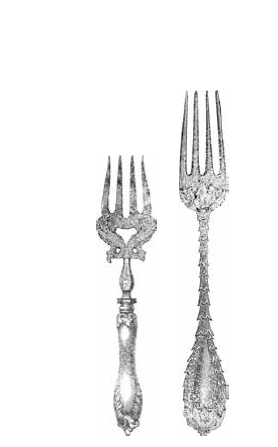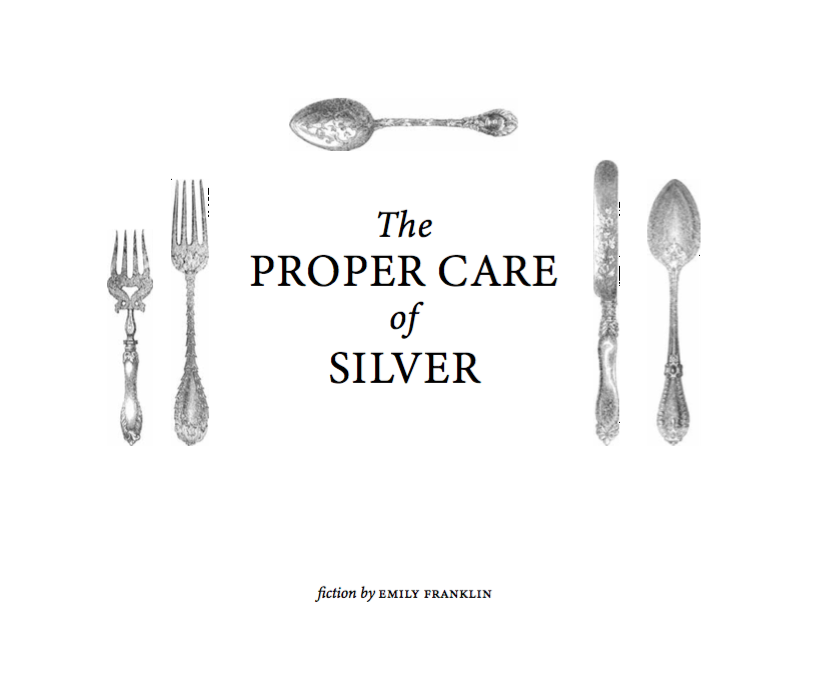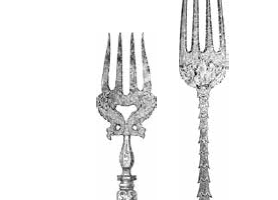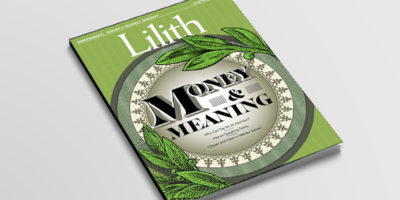
Fiction: The Proper Care of Silver
 Marianne wonders if people still say housekeeper. Maid sounds too Southern, and cleaner sounds industrial and it’s just the two of them here today, so without knowing the terminology—despite years together— they empty the sideboard of Marianne’s grandmother’s silver. Nana had used her oven to store shoes but owned a silver service for 22, including large wine holders cleverly designed to store ice in a hidden compartment. Nana had come to Washington Heights in 1939 with money rolled up and stashed in her vagina. Right in the hoo-ha, she’d told Marianne. Not once had Marianne seen the service used.
Marianne wonders if people still say housekeeper. Maid sounds too Southern, and cleaner sounds industrial and it’s just the two of them here today, so without knowing the terminology—despite years together— they empty the sideboard of Marianne’s grandmother’s silver. Nana had used her oven to store shoes but owned a silver service for 22, including large wine holders cleverly designed to store ice in a hidden compartment. Nana had come to Washington Heights in 1939 with money rolled up and stashed in her vagina. Right in the hoo-ha, she’d told Marianne. Not once had Marianne seen the service used.
“What was she thinking, bringing it all here?” Marianne says aloud to Zelia. Despite knowing Zelia won’t understand, Marianne explains how sad it is, having such pieces all go untouched. Marianne pictures Nana, spidery hands clasped in her lap, waiting for partygoers who never show up. How tragic, she thinks, but then, just as quickly, she thinks how well preserved the set is now, right there in her sideboard. “See,” she points out to Zelia, “it’s like new!”
Zelia, perched on a folding ladder, passes a silver wine holder to Marianne who places it next to its pair on the empty dining room table. Small, decorative lions on the holders gaze out at them as though they, too, are baffled as to why this massive cleaning effort when both Lily and Daniel declared they aren’t coming for Passover this year; Lily because she is celebrating Easter with Mark’s father who has no one else with whom to eat lamb and mint, and Daniel because William’s parents asked them first, which only makes Marianne feel she—the mother—should have asked at Thanksgiving although if she had she’s sure to have been scolded for thinking too far ahead. “It’s not a competition,” Daniel had told her, his voice sounding interplanetary with hands-free. “That’s exactly what it is,” she’d said. “Well,” Daniel had said, “Maybe we’ll show up. Who knows.”
“Ohmygod.” Zelia, unsteady on the ladder, drops Nana’s teapot and it lands with a muffled thud on the carpet. “Ohmygod.”
Zelia knows only a few scattered words of English. Oh my god is all-purpose—torrential rain ohmygod; Marianne’s father has lymphoma ohmygod. If Marianne needs to convey anything she has to act it out—wipe the shades in exaggerated motions or mime mopping the bathroom floor all the way to the grimy corners. Anything serious and she emails Zelia’s fifth-grade daughter to translate.
Marianne had written the instructions for today because it was crucial that the silver be handled gently, that Zelia not scratch it or put it in the dishwasher as she’d done the year before. Marianne doesn’t criticize Zelia for living in this country eight years and knowing basically nothing, but when Zelia’s sister visited from New York and demonstrated her fluency (and sisterly love by splitting the housework that week) it did make Marianne think that if only Zelia would force herself to learn she’d be so much better off. She could negotiate more hours or apply for positions with people who had child care needs or have a job that didn’t require counting forks, though it was possible Zelia liked counting the utensils, proving they were all still there, not stashed in her lunch bag and brought home to sell or to melt down and then sell.
“Oh, it’s OK!” Marianne picks up the teapot, overly cheerful to hide her disappointment. The thin spout is dented and the lid dinged. The thing survived Nazis and 70 years of tarnish and hiding in Washington Heights but can’t survive four seconds with the Brazilian housekeeper.
“Never mind,” Marianne tells her and makes a big show of putting it with its imperfect lid next to the wine holders. If Daniel shows up he will certainly notice the ding. Martin will not.
Marianne will have to show her husband, displaying for Martin the small lid on her palm like a game show hostess with a tiny hummingbird prize, and narrate what happened. The ladder, the cleaning. Martin will shake his head and examine the spout as though a.) he were a silversmith rather than a radiologist who spends his days in the dark and b.) this mishap opens the door for him to have his bi-weekly whinge session about Zelia. “If I can’t find my socks I guess I should look in the produce drawer…”
“Okay,” Zelia says and hops down from the ladder. Marianne sticks her hand out to steady the cleaner, both of them working together to fold the stubborn ladder and begin on the silverware drawer, which is a chaos of cutlery, knives wedged into fork tines. Zelia is speedy at organizing these and Marianne takes a moment to marvel at her delicate fingers, the gentle ting of each item as she fits it in exactly the correct spot.
“That looks good,” Marianne tells her and Zelia beams, the one dead and slightly gray tooth of hers prominent in the late morning sun.
Marianne chose this room for its light, bought the house without Martin even seeing it. She was pregnant with Lily then, Daniel age four or nearly so she remembers, because he used the bathroom all on his own as she wrote a deposit check. Martin didn’t mind. He praised her, actually. We have the kind of marriage, she’d bragged to friends, where we don’t have to even talk about things. She’d meant she had jurisdiction, unlike one friend who couldn’t even buy a mug—a single coffee cup—without her husband’s approval of color, design. But perhaps in the end those small conversations were necessary, crucial in a marriage—who buys a house without even discussing it?
Zelia fits the final knife into its slot in the blue velvet holder, points to the empty space where knife number twelve should be. “I don’t know.” Her voice is lyrical, music in the vowels. Iiiidunnnoooo. She doesn’t know.
She could have walked off with spoons stuck into her bra and Victoria’s Secret sweatpants and Marianne probably wouldn’t have said anything. Even when Martin’s wallet went missing for two weeks and he was driving to the hospital without an ID and having to ask the attractive night nurse to buzz him in, Marianne didn’t accuse Zelia of any wrongdoing. And, sure enough, it turned up when Marianne went to get Martin’s car inspected. He’d locked it in the glove compartment before the trip to Marrakesh, taking only a single credit card and his passport. “There are other cleaners,” he’d said.
And there are. Lois has a housekeeper who bakes tortillas when her grandchildren are visiting. And there are certainly services that come in, speak English, and don’t leave the scrub brush in the bathroom sink or rearrange the living room furniture because they feel it’s better that way. There are better cleaners. But if Marianne lets Zelia go and this new, miraculously efficient and bi-lingual woman comes, and she leaves the house tidier and—this would be the key—orderly in a way that is rational, meaning their clothes are segregated by owner not color and the golf clubs are not with the similarly sized standing dustpan—well, then what in God’s name would Marianne talk to Martin about?
Because the sad truth of it is that Zelia’s foibles are some of their best conversations these days. Martin will listen— with his eyes and face and ears—as Marianne recounts today’s escapades and she will be rapt as he flings open drawers and closet doors to reveal the latest gross injustice with his dress shirts or the wrapping paper saved from Lily’s engagement shower to which she had only been invited by phone. Martin’s fingers might accidentally lose themselves over her knuckles and maybe he’d have taken Cialis and maybe. Well.
Zelia and Marianne have a generous understanding. Marianne never criticizes her terrible cleaning or suspect organizational skills and Zelia can’t—or doesn’t— judge her employer for a.) Marianne’s messy house, jam rings on the fridge’s glass shelves, hair in the soap or b.) having a cleaner when it’s just her and Martin now or c.) the fact that Marianne gives Zelia’s daughter presents on birthdays and Christmases even though she never asked if this was okay and, as Daniel pointed out, speaks more to Marianne’s needs than to the girl’s.
Under the silverware caddy are ripple-edged Haggadahs that haven’t been used in years but which Marianne refuses to recycle because they might be used again (they won’t) and they were her mother’s (they weren’t used then, either) and since Daniel and William were already exploring birth options, they might want them (they don’t—Daniel will make his own). “I just can’t be free of them,” Marianne says, fully aware that Zelia won’t get her Passover joke. She points to the Hebrew text. “Prayers.” Zelia smiles. Last year, Marianne had made a vat of matzoh ball soup, and presented Zelia with a bowl. Marianne thought Zelia would try it and understand something about Judaism or at least have a snack that wasn’t the Coke and Filet-o-fish she normally brought for lunch, but Zelia dumped the soup into the farmhouse sink, assuming Marianne wanted her to wash the bowl.
“I wash?” Zelia reaches for a small silver cup.
“Polish,” Marianne says, miming scrubbing and immediately wondering if she still has silver cleaner. “You have to do it gently, like this.” She leads her to the sink. Zelia watches as Marianne finds the polish, uses the pads of her fingers to apply the blue-gray goop and with the smallest trickle of tepid water, rinses while scrubbing with a paper towel. “It’s Elijah’s cup. You put it on the table and wait for him.”
Later, Marianne can hear Zelia on the floor above—putting laundry away in the wrong place, arranging pillows in a way that would make sleep or getting into bed impractical at best, possibly scraping the hardwood with the new vacuum.
Marianne, ripe from the success of polishing the chalice, has a pile of silver, even the dented teapot, by the sink, her hands slicked with tarnish. You won’t believe it, she will tell Martin, I had to do the silver myself. Imagine paying 20 dollars an hour to clean your own house!
Zelia gathers her lunch from the fridge and slings on a coat the color and texture of abandoned tires; it once belonged to Marianne. “I go.”
“Ok,” Marianne says, her fingers puckered in the water. Isn’t it early for Zelia to leave? Has she done all she can? She should say something.
“No. I go…” Zelia holds her arms, the Target lunch bag swinging and crackling as she appears to do yoga or swim.
Then Marianne understands, Zelia miming an ocean wave now, flying. “Vacation?”
“Noo. I sorry. Back to Brazil.” She said this before once and then came back because it had been a six-week leave. Marianne felt her insides fold up. Zelia wouldn’t even need the handed-down coat in Brazil.
Marianne stood looking for something to give Zelia for her trip—because it could be just that, a misunderstanding or language error, right? This Brazil trip could be just a holiday, nothing permanent. She’d just open the door with her key and come right back into Marianne’s life as though there had just been simple miscommunication.
Or maybe Marianne wouldn’t lock the door and she’d find Zelia right there having milky coffee at the kitchen table. Wasn’t that possible? Nana or the kids or Martin and the cleaner all sipping and waiting for her to find them, almost as though the door had been propped open the entire time.
Emily Franklin is the author of a novel, Liner Notes, and a story collection, The Girls’ Almanac, and young adult books. Her work has been published in The New York Times, NPR, and named notable by the Association of Jewish Libraries.



